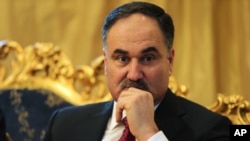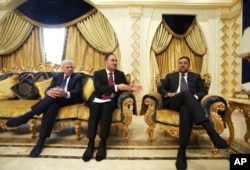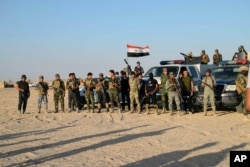A group of prominent Iraqi exiles is making a renewed push to unify the country's disaffected Sunni Arab minority into a cohesive political coalition and say their support is vital for beating back the Islamic State group.
The fledgling coalition plans to open an office in Washington in the coming weeks to advocate its cause directly to American policymakers, the initiative's main backers told the Associated Press in an interview Tuesday. The group aims to draw support from a broad spectrum of Sunni Iraqis, articulating concerns that many in the community feel have long been ignored by Iraq's Shiite-dominated government.
Sunnis ruled Iraq until the 2003 U.S.-led invasion toppled Saddam Hussein and handed power to the country's Shiite majority, a tectonic shift at the heart of much of the unrest that followed.
The Sunni-dominated cities of Mosul, Ramadi and Fallujah are firmly in the hands of IS, which has seized large swaths of Iraq and neighboring Syria. While IS's main targets are Shiite Muslims and followers of faiths other than Islam, the group frequently kills Sunnis it views as political rivals or those who simply refuse to bow to its will.
“Sunnis are asking the classical question: Are they part of Iraq? If the answer is yes, we have to be a real partner,'' said former Iraqi Finance Minister Rafia al-Issawi, who is part of the coalition. “It's time now to convince the international community ... that we are the classical and the real ally to fight against ISIS, because it is our provinces that have been occupied by ISIS,'' he continued, using another term for the Islamic State.
Many Iraqis remember al-Issawi as the official whose bodyguards were arrested in a terrorism-related sweep in late 2012 by security forces loyal to then-Prime Minister Nouri al-Maliki -- a move al-Issawi blasted at the time as a politically motivated kidnapping.
The arrests sparked months of protests and sit-ins in Sunni areas, galvanizing longstanding Sunni feelings of marginalization that IS extremists were able to exploit.
‘Two sides of the same coin’
Sheikh Khamis al-Khanjar, a wealthy Iraqi businessman who lives in Dubai, is another backer of the coalition. He is joined by Atheel al-Nujaifi, who served as the governor of Ninevah province but was later removed from office following IS's takeover of the provincial capital of Mosul, Iraq's second-largest city.
They say they are committed to crushing IS but fear that the Iranian-backed Shiite militias that have proved effective in fighting the militant group on the ground pose a grave threat to their communities.
“The truth is IS and the Shiite militias ... are two sides of the same coin,'' al-Khanjar said. “The terrorism that the Shiite militias are spreading may even be worse than what IS is doing.”
Within the next two months, the Sunni coalition leaders plan to open their Office of the Arab-Sunni Representative for Iraq in Washington. In the meantime, they are visiting regional countries to promote their vision, al-Khanjar said.
Al-Khanjar denied that foreign governments are financing the initiative -- calling such suggestions a “distortion'' -- and insisted it is being funded by Iraqi businesspeople.
But he did not rule out seeking outside help -- including military aid -- down the road.
“We currently don't need any financial help, although if we did and we asked the Arab countries for it, I'm sure they would be more than willing to help. We need military and political backing once our project begins,'' he said.
Sunni autonomy called unlikely
The Sunni effort bears similarities to the strategy pursued by Iraq's Kurdish regional government. It rules over a largely autonomous enclave of relative stability and prosperity in northern Iraq and is seen by the West as a key pillar in the fight against IS. It for years has had contacts with senior U.S. officials and operates a representative office in Washington, effectively giving it a lobbying and diplomatic channel that bypasses the central government in Baghdad.
The Sunni exiles say they can generate broad support among Sunni tribes in Iraq even though they don't currently live there.
Al-Nujaifi said thousands of Sunni fighters have been mustered in northern Iraq for a possible offensive against IS, for example.
But getting support for direct U.S. arms transfers to Sunni fighters -- rather than shipments routed through Baghdad -- is unlikely to happen, said Kirk Sowell, the publisher of the Inside Iraqi Politics newsletter.
So is setting up a separate region along the lines of what the Kurds have done.
“There is no way the Iraqi parliament will ever approve any legislation allowing for Sunni autonomy,'' Sowell said.







